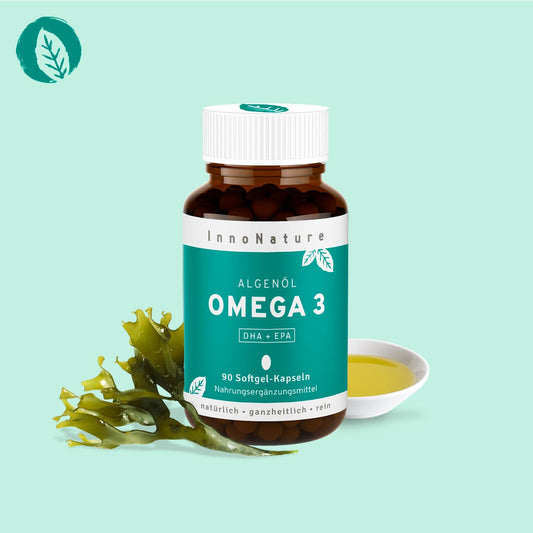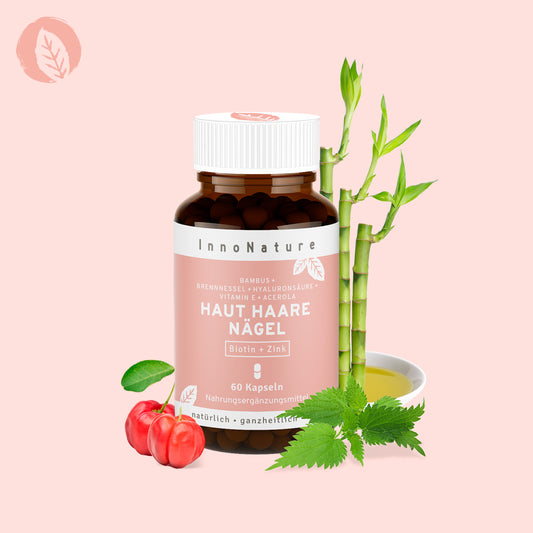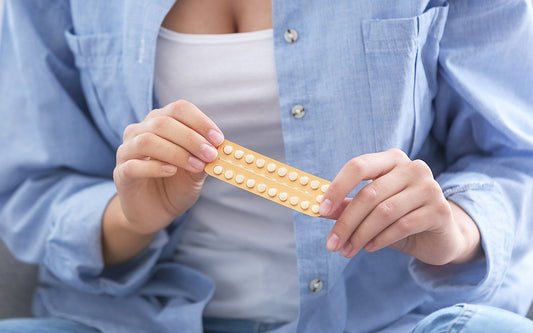
We know: Vitamin D deficiency is practically a widespread disease, at least in Northern countries, such as Germany.
In our latitudes and with our lifestyle, it is almost impossible to take in enough vitamin D, as nature intended: through the sun.
The second way to get enough vitamin D and counteract a deficiency is through dietary supplements! What your body needs the sun vitamin for, how a deficiency becomes symptomatic and what you can do about it in a natural way, we have put together in this article. Find out more and prevent a vitamin D deficiency (of course) - especially in winter!
How do I recognize the first signs?
 Is your vitamin D budget okay?
Is your vitamin D budget okay?
How does a vitamin D deficiency arise and how do I notice it? If you spend most of the time indoors and are located in an area like Germany or Northern Italy, then you can assume that you have a vitamin D deficiency - unless cod liver oil is on your daily menu.
Our modern way of life may be the cause of the shortage of an entire population. The sun shines too little and, once there, is not always utilized properly. Life often takes place indoors because of the job and our hobbies.
That's just how modern life is, but the deficiency comes, stays and does leave on its own.
But how can you tell whether you really have a deficiency? There are, of course, some signs and symptoms that indicate a vitamin D deficiency:
-
weak immune system
- fatigue
- Bone pain
- weak, declining performance
- Periodontitis
- Muscle weakness
 Of course, not all symptoms are necessarily caused by a vitamin D deficiency. The only way to be 100% sure that you are or are not deficient in vitamin D is to take a test.
Of course, not all symptoms are necessarily caused by a vitamin D deficiency. The only way to be 100% sure that you are or are not deficient in vitamin D is to take a test.
A blood test can diagnose a vitamin D deficiency, but it can also help you adjust your needs. Because: Not everyone needs the same amount of vitamin D. In addition, when adding supplements, the individual dosage is important. Are you also interested in other nutritional supplements? Then take a look at our shop.
How does the sun vitamin work in the body?
As the popular name suggests, vitamin D is a vitamin that the body can produce with the help of the sun. Therefore, vitamin is actually not the correct name, because it is much more a hormone. If your skin receives rays from the sun, the ultraviolet light causes a precursor of this hormone to be formed. The "finished" hormone is only created in the third step, after the liver, as well as cells and kidneys, have been involved in the conversion (see graphic).
Once the hormone D is formed, it takes part in numerous processes in the body. For example, it regulates cell growth and strengthens bones. If there is a deficiency, the production or regulation of other hormones can get out of balance, as vitamin D3 has an important influence on their control.
 Because such complex physical processes are not always easy to understand, we have created a graphic for understanding.
Because such complex physical processes are not always easy to understand, we have created a graphic for understanding.
The variety of areas in which vitamin D3 is involved also explains the far-reaching and diverse symptoms of a deficiency. If the symptoms are due to a vitamin D deficiency, there are, of course, some approaches to counteract this. In the following you will find some information.
Eliminating Vitamin D deficiency - can it be done naturally?
Yes, it can - but be careful! The most natural way is by absorbing the ultraviolet light from the sun. So: Soak up the sun!
When soaking up the sun, however, skin type plays an important role. Light skin types need to stay in the sun for 5-20 minutes and darker skin types even 15-25 minutes in order to get enough vitamin D. By the way: only the UV-B rays stimulate vitamin D production.
Did you know that sunscreen inhibits the absorption of vitamin D - just like clothing?
But that doesn't mean that you should lie down in the sun unprotected: sunburn and skin irritation must be avoided at all costs. The right skin care is generally very important.
It doesn't sound that easy anymore, does it? In addition, the sun is often rare in Northern regions and we often spend our day indoors. Job, hobbies and life often take place behind the pane of glass - which, by the way, also inhibits the absorption of vitamin D.

Sunbathing is the most natural way to get vitamin D. But that's not as easy as it sounds.
Vitamin D in Food: Are There Any Alternatives to Sunbathing?
So what to do when country and lifestyle make the sun, the most natural source, so difficult to access? How do I avoid a vitamin D deficiency? Are there foods that contain vitamin D3?
When considering the quantities that would need to be consumed, this idea remains theoretivcal. There are certain foods that contain vitamin D3, but, first, these are animal foods and, second, we can no longer speak of "natural" if these foods are eaten by the kilo.
According to the DGE (German Society for Nutrition) at least 800 IU (20 µg) of vitamin D are required. Achieving this value through food is difficult. According to current knowledge, an optimal vitamin D level can only be achieved at values between 2000 IU and 5000 IU, which cannot be achieved through food alone.
It is also doubtful whether visiting a solarium should be viewed as a natural way. Provided that UV-B rays are actually used, the body produces the vitamin D itself, but the radiation is still unnatural. So the sun remains the only true natural path.
In the following graphic, you can see how much of your daily vitamin D requirement is covered by food:

Vitamin D storage: is sunbathing during my vacation enough?
The sun is shining, the wool sweater is exchanged for the shirt and the face is held in the sun for a long time. Not only does it feel good, it is - in moderation - healthy and necessary.
It is the most natural way to enable the body to produce vitamin D and replenish colecalciferol stores. But is that even possible? Does our body have a reservoir from which it can draw if necessary? Is sunbathing during vacation enough to take care of the body all year round? And can we prevent a vitamin D deficiency in this way in the long term? The answer is simple and disappointing: No.
If you use the summer sun extensively and correctly, your own body storage is well replenished, but that will not be enough for a whole year. In our latitudes, vitamin D cannot be absorbed from the sun during the winter months. That is why it is especially important to ensure that there is sufficient supply, because no one needs bad mood AND bad weather.
 Winter has a lot in store - but not vitamin D.
Winter has a lot in store - but not vitamin D.
Who should take vitamin D as a supplement?
Dietary supplements don't sound as natural as the sun. The very meaning of the word implies that something has to be consumed, which is not covered by food.
Unfortunately, it is a fallacy to believe that a balanced diet can prevent vitamin D3 deficiency. Without question, it is important to have a varied and wholesome menu. Much can be influenced and even cured by it. But, in this case, we cannot deny the following fact: Vitamin D and a healthy diet have nothing to do with each other. Because hardly anything is healthy, if eaten in extreme quantities. Thus, it is worth considering whether the addition of selected supplements at this point is the more natural way.
Vitamin D as drops or capsules?

For many people, swallowing capsules is torture. Drops are a good alternative here.
Once the search for an adequate dietary supplement is underway, you will quickly realize that the market is flooded by products. Of course, though, you should look carefully. Both the ingredients and the dosage form of the various vitamin D preparations can vary widely. Bioavailability, i.e. how much the body can actually absorb and use from the vitamin, is very important! The quality of the ingredients and the addition of additives should be considered. What can be checked well in advance is the form in which the preparation comes: drops or capsules.
The ideal intake of D3
The best way is to take D3 as drops - enriched with oil. And not just because it benefits babies, children and people who do not like to swallow pills. Since vitamin D is a fat-soluble vitamin, it is best absorbed by the body with oil.
If you use high-quality and healthy oil such as olive oil, your body can additionally benefit from the positive properties of the oil.

An added bonus: Olive oil is a great addition to delicious avocado bread.
Dosing Vitamin D correctly
Once the product has made its way into your life, the next hurdle is waiting: the right dose. There is a lot of information on dosing D3 out there. You can, of course, take the daily recommendation, which is usually stated on the packaging, as a guide. That is a good guideline. In fact, though, the perfect dosage depends on various external and internal factors, such as your individual vitamin D deficiency.
The external factors include, for example, the place of residence, including latitude, altitude and the season. The internal factors include: skin type, age and the use of sunscreen, including clothing.
These factors affect the vitamin D production even in the summer months, in which, in theory, the entire requirement could be covered by the sun. In the winter months, the sun's rays are not sufficient in many regions to even stimulate vitamin D production, which is why a year-round (varying) addition through supplements is recommended.
Tip: First of all, get yourself tested to see whether and to what extent you have a deficiency. If the vitamin D deficiency is very high, a so-called charging phase is started, in which the vitamin is taken in particularly high doses. In contrast to the absorption through the sun, it should be noted that there is definitely a "too much". While the body has an automatic protective function when D3 is absorbed by the sun and stops producing vitamin D after a certain period of time, it may not be able to do so when taking supplements. An overdose is theoretically possible. This is not common, as very high amounts of vitamin D would have to be taken every day, but it cannot be completely ruled out.
Vitamin D: the initial therapy
In order to increase a very low vitamin D value as specifically as possible, a short-term intake of 10,000 IU / day can be made, for example. This amount increases the vitamin in the blood level by about 1 ng / ml.
The following formula can be used to specifically calculate personal needs:
Total dose = (target value - actual value) x 10.000 I.U.
Example: An initial value of 20 ng/ml needs to be increased to 30 ng/ml.
Total dose = 30-20) x 10.000 = 100.000
The intake of 10,000 I.U. over about ten days therefore leads to the desired value.
Vitamin D: the maintenance therapy
The recommended daily dose for maintaining a sufficient vitamin D level is 1000 IU.
It is theoretically also possible to achieve a long-term increase in the vitamin D value in the blood with this dosage in order to increase the blood value by about 1 ng / ml.
The following formula can be used to increase the blood level by about 1ng / ml:
Total dose = (target value - actual value) x 100 I.U.
However, since it would take months to achieve the required value in this way, the initial therapy with a higher dose is also recommended here.
(Source: www.vitamind.net)
Vitamin D3 and Vitamin K2: why you should take both at the same time
Since vitamin D is responsible for the absorption of calcium from food, it is possible to overdose calcium intake if the dosage is much too high. To counteract this risk and to make the best possible use of vitamin D, we recommend adding vitamin K2.
Vitamin K2 is responsible for transporting calcium to where it is needed (for example in the bones). If there is a vitamin K2 deficiency, it can happen that the calcium is uselessly deposited, which leads to calcification.
Calcium is also useful in combination with vitamin D3 and K2.
Our tips for you:
The topic of vitamin D is a broad field and a lot of half-knowledge is spread. With so much information, tips and recommendations, it is of course not easy to keep a clear view. It is therefore all the more important to obtain information from the right sources. Based on this and with the help of a test, it can then be decided which way out of the deficiency is the best for you personally.
The body only works properly when it is in harmony. To help it do this, particular caution should be exercised when choosing nutritional supplements. Unnecessary additives or wild combinations can be more difficult for the body to use than they are useful. Therefore: the more natural, the better.
Vitamin D3 drops from InnoNature
Balancing the vitamin D value is sometimes difficult enough. So is choosing a suitable product. That's why we decided to simply manufacture the perfect product ourselves.
All natural, holistic and pure. Our vitamin D3 is vegan, highly-dosed, highly bioavailable and, in addition to the active ingredient itself, only contains high-quality olive oil (97.1%) and corn oil.
100% natural products:
At InnoNature, the naturalness of the products is very important to us. Very carefully selected raw materials with particularly high added value find their way into our drops and capsules. Because we believe that health goes hand in hand with naturalness.
Our products are made not only to alleviate symptoms, but also to compensate for deficiency with the power of nature.
100% natural vitamin D3 drops from InnoNature
✔ Highly dosed with 1000 I.U. (25 μg) per drop
✔ 1750 drops in total
✔ 100% natural ingredients
✔ vegan
✔ tested / certified by an independent laboratory
✔ Pleasant taste of olive oil
✔ Practical dosing with a pipette (natural rubber)
✔ Virgin olive oil from controlled cultivation in Spain
✔ For the immune system, bones and muscles
100% natural vitamin K2 drops from InnoNature
✔ Highly dosed with 200µg daily dose (10 drops)
✔ 1,750 drops in total
✔ 100% natural ingredients and vegan
✔ Pleasant taste of olive oil
✔ Practical dosing with a pipette (natural rubber)
✔ Virgin olive oil from controlled cultivation in Spain
✔ Very good supplement to vitamin D3
✔ For bones and blood clotting

For a long time, I looked for a way to compensate for my vitamin D deficiency. But too many dietary supplements promise a lot and keep little. Our vitamin D3 only combines the essentials and is therefore highly effective! It helped me.
We design all of our products according to this principle. With us, everything is vegan and made in Germany.
Every single product has special features that distinguish it from other dietary supplements.
Are you curious? Then just have a look around!








